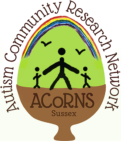On Wednesday 18th October, we launched our first Autism Research Journal Club meeting. This is a new group, aimed primarily at students to attend and spend time engaging in published journals with a focus on Autism research – if you’re interested in joining us, more information is available on our Instagram (@acorns_sussex) or send us an email!
During this first group, we looked at an article entitled ‘Making the Future Together: Shaping autism research through meaningful participation’. (https://journals.sagepub.com/doi/full/10.1177/1362361318786721?rfr_dat=cr_pub++0pubmed&url_ver=Z39.88-2003&rfr_id=ori%3Arid%3Acrossref.org)
The article looks at the method of Participatory Research, a model of research that focuses on collaboration and inclusion of the people being studied, alongside the researchers. The idea is, in essence, to include autistic people fully when researching.
We considered the effect of the surprising lack of awareness of the realities of autism by the general public. Autism research has been happening for over fifty years, and yet there remains a great deal of stigma and misinformation which impacts the lives of many. In light of the paper, we discussed why this may be, and in what ways participatory research could have a positive impact.
Participatory research focuses upon the inclusion of autistic people in autism research in order to collaborate. It helps avoid methods that separate neurotypical researchers, who may lack understanding themselves, and the autistic people the research seeks to understand better. This helps avoid the potential pitfalls through communication, and ideally results in a greater understanding of autism for all parties.
Our discussion also led us to consider the theory of monotropism, a theory not everyone present had been aware of before, and which led to a very interesting discussion. Monotropism is a theory that suggests that autistic people will experience a thinking style in which mental resources will be focused upon a limited number of interests or tasks at a time. As a result, autistic people would be able to achieve a very high concentration on those specific interests or tasks, but may have difficulty switching to another interest or task. It was fascinating to discuss, and piqued my own interest, leading to some further research after the session for myself.
The reading group were also interested by the mention of the ‘Double Empathy’ problem mentioned in the article.
The double empathy problem considers that autistic people and non-autistic people may experience difficulties when understanding one another and exist in a state of ‘mutual incomprehension’. In the paper, this idea is examined: the ability to be upfront with one’s opinions of research plans or processes can be a strength.
It was, overall, a very interesting discussion, and we look forward to our next meeting!
